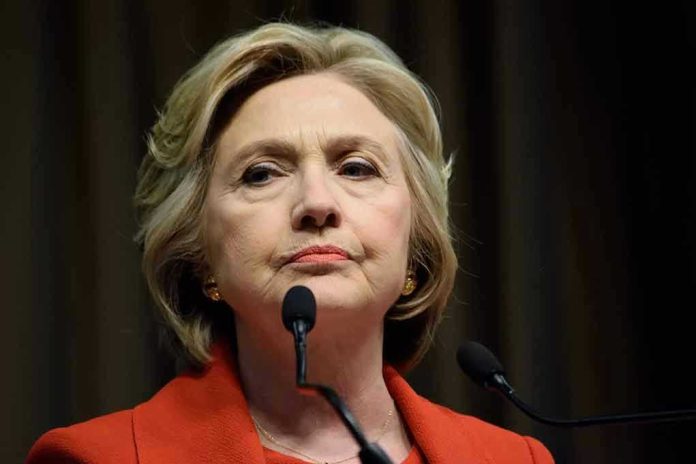
Congress has subpoenaed Bill and Hillary Clinton along with top former DOJ and FBI officials in a sweeping probe of the government’s handling of the Jeffrey Epstein scandal, signaling an unprecedented push for transparency and accountability at the highest levels of power.
Story Snapshot
- The House Oversight Committee has issued subpoenas to Bill and Hillary Clinton, former Attorneys General, and former FBI Directors regarding the Epstein case.
- The Department of Justice faces an August 19, 2025 deadline to release all Epstein-related documents to Congress.
- This bipartisan move follows deep public frustration over past government secrecy and the DOJ’s controversial conclusion ruling Epstein’s death a suicide with no “client list.”
- Lawmakers are considering declassifying Epstein case files, raising questions about elite accountability and potential reforms to sex trafficking laws.
Congress Demands Answers in Epstein Investigation
On August 5, 2025, the House Oversight Committee issued formal subpoenas to former President Bill Clinton, former Secretary of State Hillary Clinton, and numerous past leaders of the Department of Justice and FBI. This action comes as part of a bipartisan investigation into how federal authorities managed the Jeffrey Epstein case, an issue long plagued by allegations of cover-ups and elite privilege. The Committee also ordered the DOJ to produce all Epstein-related materials by August 19, 2025, with lawmakers warning of a full House vote to declassify files if demands are not met.
Epstein’s death in 2019, officially ruled a suicide, sparked years of public skepticism and conspiracy theories. Critics have pointed to the DOJ’s recent statement asserting no “client list” exists, fueling further distrust. The bipartisan nature of the new subpoenas—targeting high-profile figures from both major parties—reflects a rare political alignment on the need for government transparency and accountability in cases involving sex trafficking and abuse of power.
Scope and Stakes of the Subpoenas
The committee’s subpoenas reach deep into the nation’s political and law enforcement elite, including six former Attorneys General and two former FBI Directors. Chairman James Comer and supporting lawmakers emphasize a need to uncover potential government failures and inform legislative reforms to better protect victims of sex trafficking. The committee’s actions suggest a willingness to challenge political taboos and address widespread concerns about possible corruption, favoritism, or mishandling by federal officials entrusted with upholding the law.
For many Americans—especially those frustrated by years of perceived government overreach and lack of accountability—this investigation signals a long-awaited reckoning. The Committee’s demands for testimony and documents from figures such as Bill Clinton, who had documented associations with Epstein, underscore the seriousness of the probe. The potential declassification of Epstein files in September could set a powerful precedent for congressional oversight of sensitive criminal investigations, with implications for how future cases involving elite suspects are handled.
Bipartisan Unification and Constitutional Accountability
Unlike many recent political battles, the Epstein inquiry has drawn support from both Republican and Democratic lawmakers. Speaker Mike Johnson has reiterated the House’s commitment to transparency, declaring that there is “no fear” among House Republicans in pursuing the truth. This rare unity enhances the credibility of the investigation and heightens pressure on the Department of Justice to comply fully. If the DOJ fails to turn over requested documents by the deadline, the House is prepared to vote on declassifying the case files, a move that could expose previously hidden details and further shake public trust in government institutions.
Expert legal commentators note that congressional investigations of this magnitude—especially those involving former presidents and cabinet-level officials—are virtually unprecedented. Scholars stress the importance of striking a balance between public transparency and the due process rights of those subpoenaed. As the investigation unfolds, its outcomes may shape future legislative reforms, impact the public’s faith in government, and provide long-overdue answers in one of the nation’s most troubling scandals.
Short- and Long-Term Implications for American Values
The immediate effects of the subpoenas include heightened scrutiny of the DOJ and FBI and significant reputational risks for those called to testify. In the longer term, the probe could drive legislative changes to sex trafficking laws and plea agreements, serving as a test for Congress’s ability to hold even the most powerful figures accountable. For conservatives concerned about government overreach, loss of constitutional rights, and elite impunity, this investigation represents a critical step toward restoring the rule of law and reaffirming core American values. The entire nation will be watching as these dramatic developments unfold in the coming months.
🚨GHISLAINE MAXWELL TESTIFIES: CLINTON BLACKMAIL, EPSTEIN’S BODY FILES, AND HILLARY’S ALLEGED KILL LIST HANDED TO FOREIGN INTELLIGENCE
Ghislaine Maxwell detonates a political nuke: Bill Clinton was blackmailed by Epstein, not just over sex, but over bodies — “hundreds” of them.… pic.twitter.com/UOlxob7RGa
— CrazyDutch17 (@DSqldier17) July 30, 2025
While the scope of the investigation and the full contents of the Epstein files remain uncertain, the Committee’s actions send a clear message: no one is above congressional scrutiny, and the public’s demand for the truth will not be ignored. The coming deadlines and potential declassification votes could mark a turning point in the fight for transparency, justice, and constitutional accountability in America.
Sources:
2025.08.05 Subpoena Cover Letters
House Oversight subpoenas DOJ, Clintons, Comey in Epstein probe
House Oversight Committee issues subpoenas for Epstein files




